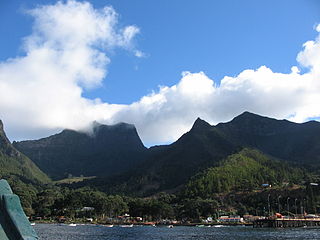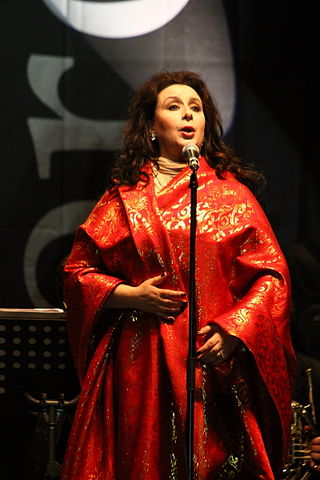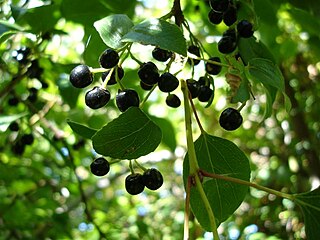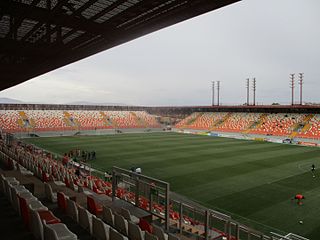Related Research Articles

The Juan Fernández Islands are a sparsely inhabited series of islands in the South Pacific Ocean reliant on tourism and fishing. Situated 670 km off the coast of Chile, they are composed of three main volcanic islands: Robinson Crusoe, Alejandro Selkirk and Santa Clara. The group is part of Insular Chile.

Ugni molinae, commonly known as Chilean guava berry, or strawberry myrtle, is a shrub native to Chile and adjacent regions of southern Argentina. The local Spanish name is murta, and the Mapuche Native American name is "uñi". It is in the same botanical family as the guava, in Myrtaceae.

Santa Clara Island is a tiny, uninhabited island in the Pacific Ocean, off the coast of Robinson Crusoe Island in a group of islands known as the Juan Fernández Islands. The island is of volcanic origin and is approximately 1 km (0.6 mi) long and 0.6 km (0.4 mi) wide. The island group is politically part of the South American country Chile, and is administratively assigned to the Region of Valparaíso.

Archipiélago de Juan Fernández National Park is a national park located in the Pacific Ocean 665 kilometres west of Chile's mainland port of San Antonio, in the Juan Fernández Archipelago. The park covers 96 square kilometres and comprises the Santa Clara, Alejandro Selkirk and the most part of the Robinson Crusoe Island islands.

Club Deportivo Ñublense is a professional football team based in Chillán, Ñuble Region, Chile. The club was formed in 1916 under the name of Liceo Fútbol Club. They compete in Chile's Primera División league.

Verónica Villarroel González is a Chilean operatic soprano. She won the Metropolitan Opera National Council Auditions in 1989, and, from 1992 until her effective retirement from the stage in 2014, sang leading roles throughout Chile, as well as in New York and across the world. She then established her own academy, and later the Verónica Villarroel Foundation to provide scholarships for young singers.
Many Basques arrived in Chile in the 16th, 17th, 18th, 19th and early 20th century from their homeland in northern Spain and parts of southwestern France, as conquistadors, soldiers, sailors, merchants, priests and labourers. Due to their traditional hard work and entrepreneurship, many of them rose to the top of the social scale and intermarried into the Chilean elites of Castilian descent, giving birth to the new Basque-Chilean aristocracy in Chile. This union is the basis of the Chilean elite of today. But also, they immensely contributed to the ethnic make up of the bulk of the Chilean population. The Basque settlers also intermarried into the Mestizo and Castizo population of central Chile in the middle of the colonial period to form the large Criollo population that exists in Chile today; Castizos create modern middle and lower classes. Many years after the first waves of settlers, thousands of Basque refugees fleeing Spanish Civil War in 1939 also settled and have many descendants in the country and have even intermarried with Spanish ethnic groups other than Castilians, and other European ethnic groups. An estimated 1.6 million (10%) to 5 million (30%) Chileans have a surname of Basque origin. This figure is to the least as the number of Basque descendence is great and plentiful. Due to Basque migration, Chile has a higher number of people of Basque descent than the Basque Country itself.

Aristotelia chilensis, known as maqui or Chilean wineberry, is a tree species in the Elaeocarpaceae family native to South America in the Valdivian temperate forests of Chile and adjacent regions of southern Argentina. Limited numbers of these trees are cultivated in gardens for their small edible fruits. Wild-harvested fruits are commercially marketed.

The Commune of Santiago is the central commune of the Santiago Province, located at the center of the Santiago Metropolitan Region in Chile's Central Zone. Locally, Santiago is usually abbreviated Stgo. It is also called as "Santiago Centro" (Central Santiago) in order to differentiate it from Greater Santiago, a larger entity which includes Santiago Commune along with other 36 communes.

Barrancas is an underground metro station on Line 5 of the Santiago Metro network in Santiago, Chile. It is located underneath the junction of Teniente Cruz Avenue and General Bonilla Avenue on the border of the communes of Pudahuel and Lo Prado, between Laguna Sur station and Pudahuel station. It also lies parallel to the Route 68 highway which connects Santiago with Valparaíso and Viña del Mar, and the highway crosses over the underground metro line. The station has disabled access.
Fernando Rosas Pfingsthorn was a Chilean orchestra conductor and one of the founders of the Youth and Children's Orchestras Foundation of Chile.

Estadio Municipal "Zorros del Desierto" de Calama is a football stadium in Calama, Chile owned by the Municipality of Calama, it is the home field of the Cobreloa football team and sometimes used by Chile national football team to serve as home ground. This stadium was used like homeground of Deportes Iquique on Copa Libertadores 2017 and Cobresal in Copa Libertadores 2024. This is the Fifteenth largest stadium in Chile by Capacity in 2024.
Juan de Sanct Martín, also known as Juan de San Martín, was a Spanish conquistador. Little is known about De Sanct Martín, apart from a passage in El Carnero (1638) by Juan Rodríguez Freyle and Epítome de la conquista del Nuevo Reino de Granada, a work of uncertain authorship. He took part in the expedition from Santa Marta into the Eastern Ranges of the Colombian Andes led by Gonzalo Jiménez de Quesada and founded Cuítiva, Boyacá in 1550. Juan de Sanct Martín headed the left flank of the Spanish troops in the Battle of Tocarema against the Panche on August 20, 1538, while his fellow conquistador Juan de Céspedes commanded the right flank. In this battle, Juan de Sanct Martín killed the cacique of the Panche and was hurt himself. Juan de Sanct Martín had confronted the Panche the year before, when he was sent to the west while De Céspedes went south. Due to the resistance of the bellicose Panche, De Sanct Martín returned to the Spanish camp.
Pedro Fernández de Valenzuela was a Spanish conquistador who took part in the expedition of the Spanish conquest of the Muisca led by Gonzalo Jiménez de Quesada from 1536 to 1538. He was the cousin of Hernán Venegas Carrillo and after his journey in the New World returned to Córdoba. He was buried in the church of the former Hospital San Bartolomé de las Bubas in Córdoba.
Martín Yañéz Tafur was a Spanish conquistador who participated in the foundation of Cartagena, the Spanish conquest of the Muisca and the conquest of the Panche.
Gonzalo García Zorro was a Spanish conquistador who participated in the Spanish conquest of the Muisca people. García Zorro was encomendero (mayor) of Santa Fe de Bogotá for seven terms, and received the encomiendas of Fusagasugá and Fosca.

Emilia Iris Nuyado Ancapichún is a Chilean politician of Mapuche-Huillliche descent. Since March 11, 2018 she has been a member of the Chamber of Deputies representing the 25th district in the Los Lagos Region. She also became one of the first two Mapuche women elected to the Chilean Congress, together with her conservative counterpart Aracely Leuquén.

Humberto Waldemar Asdrúbal Baeza Fernández, also known as Tito Fernández, El Temucano, was a Chilean singer-songwriter and folklorist. He recorded and released more than 40 albums from the 1970s to the present.

Juan José Martin Bravo is a Chilean climate activist. He is president of CVerde, and he was a general coordinator of the COY15 In 2018, Cverde was awarded the National Environmental Award of Chile.
References
- ↑ "Voces Femeninas desde Juan Fernández > Podcast > Fundación Lepe". Fundación Lepe (in Spanish). Retrieved 2024-10-07.
- 1 2 "Seremi de la Mujer llegó hasta el Archipiélago Juan Fernández para presentar la agenda de género – MinMujeryEG". minmujeryeg.gob.cl. Retrieved 2024-10-07.
- 1 2 "Honorable Cámara de Diputadas y Diputados". www.camara.cl (in Spanish). Retrieved 2024-10-07.
- ↑ de Rodt Araya, Sara (2018). "Prevenir Extinciones en el Archipiélago Juan Fernández, requiere toda una comunidad". www.islandconservation.org. Retrieved 2024-10-07.
- 1 2 "Archipiélago de Juan Fernández: el tesoro del mar chileno y su lucha por la conservación". Ladera Sur (in Spanish). Retrieved 2024-10-07.
- ↑ OnAllBands (2024-03-15). "DX Engineering-Sponsored CB0ZA Juan Fernandez Islands DXpedition a Big Success". OnAllBands. Retrieved 2024-10-07.
- ↑ Veliz, María José. "Libro de Cuentos del Mar de Juan Fernández es lanzado con éxito en Robinson Crusoe". Milenio | Ciencia de Excelencia para Chile (in Spanish). Retrieved 2024-10-07.
- ↑ "Ilustre Municipalidad de Juan Fernández". munijf.cl. Retrieved 2024-10-07.
- ↑ "Ilustre Municipalidad de Juan Fernández". munijf.cl. Retrieved 2024-10-07.